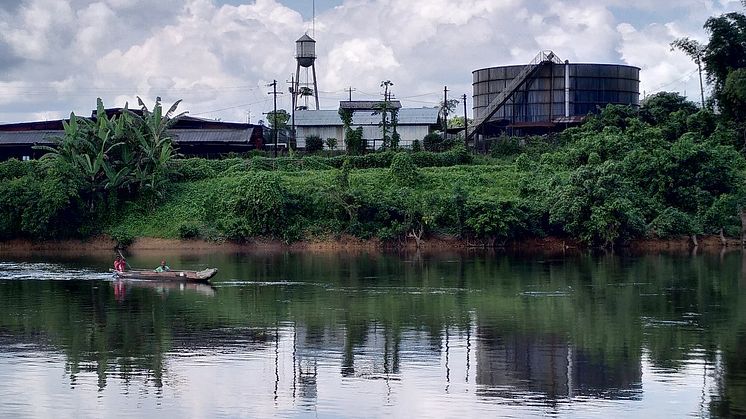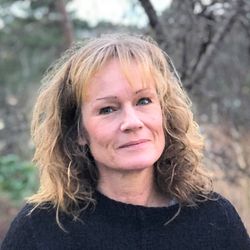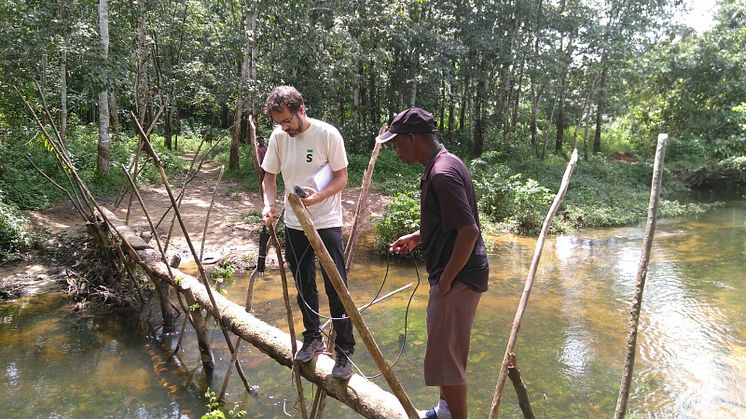
Blogginlägg -
New president in Liberia – 10 % of the country’s land mass is conceded to a company from the UAE
Liberia's new president Joseph Boakai takes office this week after a historic peaceful election in November 2023. He wants to tackle corruption and review land concessions in the mining industry. At the same time, the company Blue Carbon LLC from the United Arab Emirates (UAE) have signed a memorandum of understanding (MoU) for huge forest land concessions for carbon credits in Africa, including in Liberia. During COP28, carbon offset was presented as a smart climate solution - but what are the consequences for the countries where the carbon offset takes place?
Analysis by Jessica Johansson, interim Program Officer at Swedwatch and responsible for the organization's work with Liberia.
On January 22, Liberia's new President Joseph Boakai took office after narrowly defeating incumbent President George Weah in the November runoff. Boakai takes office in Liberia after the previous government signed a MoU with the company Blue Carbon LLC from the United Arab Emirates, in which Liberia will grant 10 percent of its land for carbon offset.
The election - and now the inauguration of the new president – can be seen as an important milestone in the country's democratic and peacebuilding history. The election marked twenty years since the country's two civil wars ended (1989-2003) and the Accra Peace Agreement was signed.
In addition, it was the first election since UN peacekeeping forces left the country in 2018. Despite some concerns about unrest before the election, two rounds of voting were conducted without major violence, with international election observers stating that the election was mostly peaceful and well administered.
Natural resource management, business, and challenges to sustaining peace
Joseph Boakai takes over the presidency at a time of economic crisis, in addition to the already existing structural challenges to peace and development. The newly elected president wants to tackle the country's corruption and review whether the country's extensive land concessions in the mining industry have benefited the population. The country has sustained the peace for two decades, a development that has made the country go from being one of the continent's most unstable countries to being one of the more stable, according to the UN's Resident Coordinator.
At the same time, sustained peace is a complex equation that depends on many factors. Many root causes of conflict remain, such as widespread poverty, social tensions, corruption, unsustainable management of natural resources, and local land disputes. The tensions surrounding the land issue arise both around land ownership, the role of companies in land management and because of changes in traditional livelihood and means of sustenance that impact groups differently.
The UN Working Group on Business and Human Rights made its first visit to Liberia in November 2022. After the visit, the expert group concluded that the role of companies in conflict in Liberia has never been fully addressed - neither linked to today's social tensions around natural resources nor the role of companies during the wars (1989-2003).
Swedwatch has worked with a focus on business, human rights, environment, and peacebuilding in Liberia for many years, in close cooperation with Liberian civil society organizations. Before the election, Swedwatch wrote that even though the election is a milestone in the country's peacebuilding journey, many challenges connected to business, human rights and conflict prevention remain.
Unsustainable management of natural resources and short-term corporate interests have resulted in pollution of land, air, and water sources, affecting access to food, water and arable land for people in local communities. Women are often excluded from decision-making around land and natural resource management, despite the fact that women's role in decision-making is a central part of peacebuilding work.
In interviews with residents in local communities in large-scale land concession areas, many stated that loss of traditional livelihoods and less access to arable land often contributed to social tensions and local land disputes. Such interview responses should be seen in a context where over half of the country's population lives below the poverty line, and 85 percent of the population work in the informal sector in subsistence farming, fishing and small-scale artisanal mining.
Land concessions and Blue Carbon
The new President Boakai has opened up the possibility of reviewing the country's land concessions in certain sectors. In an interview with Reuters, he highlighted that "the mining sector has been one of the problems in this country. I have seen our resources exploited and the life of the people remains the worse". During his presidency, he therefore wants to review the country’s mining concession agreements - to see if these really benefit the country's population.
At the same time, a MoU has been concluded between the Government of Liberia and the company Blue Carbon LLC, led by Sheikh Ahmed Dalmook al-Maktoum, a member of the ruling royal family of Dubai in the United Arab Emirates. The draft deal implies that 10 percent of Liberia's land is conceded to the company for 30 years to offset carbon dioxide emissions. The company was founded less than a year ago and similar agreements are being concluded with Tanzania, Kenya, Zambia, and Zimbabwe. In total, these land deals cover an area almost equivalent to the land mass of United Kingdom.
Liberia's political opposition as well as national and international civil society organizations have criticized the suggested agreement, stating that it might violate a number of national laws, such as The National Forestry Reform Law, the Land Rights Act, and the Community Rights Act.
Although these "green agreements" may seem more environmentally promising (as the aim is to preserve forest land, as opposed to extracting finite natural resources), the agreements may still involve violations of human rights, corruption risks or increased conflict risks. Such violations may, for example, involve the displacement of residents in the area, or restrictions on their freedom of movement. It could also involve the transfer of power from local communities to foreign interests, potentially violating Liberia's Land Rights Act 2018, a law that recognises customary law and gives people in local communities decision-making rights over the land on which they live.
Climate compensation and net zero goals
According to the IPCC - the UN’s The Intergovernmental Panel on Climate Change - net zero goals play an important role in reducing carbon dioxide emissions and slowing down climate change. Net zero targets can be reached through reduced emissions or through climate compensation, for example by buying carbon credits from forestry that favours carbon storage.
At the same time, skewed scenarios can arise if companies do not significantly reduce their emissions and instead use climate offsets as a way to avoid reforming outdated and unsustainable business models. Then, for example, oil producers can continue (and in some cases increase) the extraction of oil, while at the same time climate compensate for this by using large parts of other countries' land, as in the case of Liberia and Blue Carbon LLC.
Now that Liberia's new president Boakai is to review the mining industry's concession agreements to see whether they have benefited the country and its population, the same review should be conducted for the future so-called “green” carbon offset agreements. It is not only the extractive industries that should be scrutinized to evaluate the effects on human rights and potential conflict risks.
Even the "green" climate compensation agreements should carefully undergo a so-called due diligence, including consultations with relevant stakeholders. In countries with a history of conflict or with a higher risk of violence and political instability, due diligence of agreements should also be designed based on the principle of conflict sensitivity (so-called “heightened” human rights due diligence”). This is to avoid violations of human rights and increased conflict risks linked to business operations. Apart from concerns around due diligence, the example of Liberia and Blue Carbon also points to a larger debate about the function of net zero targets and climate compensation schemes.
- If you want to be kind, you call net zero creative accounting. If you are frank, you call it fraud, says Isak Stoddard, doctoral student in natural resources and sustainable development at Uppsala University, in an article with the Swedish newspaper Dagens Nyheter (27/11-23).
The same article also reports that oil giants such as Shell, BP, Chevron, Exxon Mobile, Saudi Aramco, Total and Equinor/Statoil are in the process of increasing the extraction of gas and oil. Instead of phasing out fossil fuels and reducing emissions from the beginning, climate compensation schemes can become a backdoor where producers of fossil fuels compensate emissions, while expanding oil and gas extraction in parallel. Such schemes can create distorted incentives, where vulnerable groups in countries such as Liberia, Tanzania, Kenya, Zambia and Zimbabwe might have to pick up the bill for wealthier countries' emissions.
The main purpose of climate targets and net zero targets should instead be to reduce CO2 emissions from the start.


